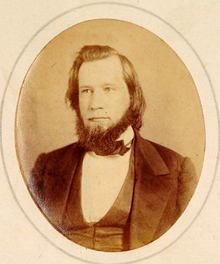Lucius Quintus Cincinnatus Lamar
Lucius Quintus Cincinnatus Lamar II (September 17, 1825 – January 23, 1893) was a Confederate soldier, American politician, diplomat, and jurist.Beyond his studies, he participated in campus debating activities, where he gained experience in public speaking and knowledge of important issues of the time such as slavery.In 1845, a few months before his twentieth birthday, Lamar moved to Macon, Georgia, where he studied law in his uncle's office for two years.[16] Using family connections associated with the Longstreet name, Lamar took his first steps into politics when Newton County sent him as a delegate to the state Democratic convention in Milledgeville in 1847 and 1849.[21] A decade later, after his brief return to Georgia described below, Lamar owned 31 slaves in Lafayette County, Mississippi, of whom 14 were female and 17 male, including 9 boys and 4 girls under 10.With support from former congressman A. H. Chappell, Lamar sought the Democratic nomination in 1855 for Georgia's 3rd congressional district but failed to gather enough votes at the convention to become his party's candidate.The Memphis Daily Appeal suggested Lamar as a possible candidate under the Democratic ticket, though he faced difficulties due to his prior support of Howell Cobb, a leader of the Union movement.[37] Lamar's antebellum congressional career primarily focused on sectionalist issues, especially protecting Southern interests in slavery.Lamar supported the proslavery Lecompton Constitution in Kansas without popular ratification, which was the subject of a debate on the House floor on the morning of February 6, 1858.[42] While Lamar never directly advocated for secession, he mentioned it as possible if the South lost the ability to check the majority abolitionist opinion in the government.[43] After the victory of Republican candidate Abraham Lincoln in the November 1860 presidential election was clear, Lamar left Washington on December 12, 1860, to canvass for a seat in the upcoming Mississippi secession convention.Following the conventions, Lamar accepted a professorship of mental and moral philosophy at the University of Mississippi and planned to retire from Congress at the session's end.[49] With the victory of Abraham Lincoln, Mississippi Governor John J. Pettus convened the state's congressional delegation to recommend a policy on secession.[50] A day after the governor's conference, he proposed a plan for the creation of a confederacy at a mass meeting in Brandon, Mississippi, though it attracted little support by other southern leaders.On January 9, the committee presented the Mississippi Secession Ordinance which Lamar had authored prior to the convention;[53] by a vote of 70 to 29, the document passed.Lamar entered active service as a lieutenant colonel in the Confederate army, where he and his law partner C. H. Mott organized the 19th Mississippi Regiment of volunteers in Oxford.[57][58] While in Richmond, Lamar gave a closing address to an event headed by Jefferson Davis, where he proclaimed:"This very night I look forward to the day when this beloved country of ours— for, thank God![60] He returned to Richmond in November, and once there he acted as an adviser for Davis, in which he assisted him with an attempt to mend relations with General Joseph Johnston.[62] While preparing for another engagement, Lamar suffered a violent seizure, forcing him to quit combat and head to Richmond to recover.Lamar assisted other confederate officials in France and England,[66] though he failed to convince audiences in either country to recognize the Confederacy.The successful practice was dissolved following health troubles, leading Lamar to accept a less-demanding professorship position at the University of Mississippi for the fall term of 1866.[80] Lamar had developed a reputation during the 1870s and 1880s as a leading contributor to the Democratic Party's opposition to the predominantly Republican African-American officeholders in Mississippi.Lamar's testimony before the 42nd United States Congress's Joint Committee to Inquire into the Conditions of Affairs in the Late Insurrectionary States reveals that he was a passionate defender of the Southern social order and the Ku Klux Klan, a secret society which had developed in response to the Thirteenth and Fourteenth amendments and the events of Reconstruction."[95] The Republican-dominated Senate Judiciary Committee reported against his nomination because of lack of legal experience and old age; he was the second oldest nominee ever at the time.Lamar was later featured in John F. Kennedy's Pulitzer Prize–winning book, Profiles in Courage (1957), for his eulogy for Massachusetts Senator Charles Sumner (R) in 1874, along with his support of the findings of a partisan congressional committee regarding the disputed presidential election of 1876, and for his unpopular vote against the Bland–Allison Act of 1878.









Lucius Quintus Cincinnatus Lamar ISenator Lamar (disambiguation)Associate Justice of the Supreme Court of the United StatesGrover ClevelandWilliam Burnham WoodsHowell Edmunds JacksonUnited States Secretary of the InteriorHenry TellerWilliam VilasUnited States SenatorMississippiJames AlcornEdward WalthallChairman of the House Democratic CaucusMichael C. KerrSamuel J. RandallWilliam E. NiblackHiester ClymerU.S. House of RepresentativesGeorge HarrisHenry MuldrowDaniel WrightGeorgia House of RepresentativesNewton CountyEatontonGeorgiaVinevilleOxfordDemocraticEmory UniversityConfederate States of AmericaBranchConfederate States ArmyColonelAide-de-campThird Corps, Army of Northern Virginia19th Mississippi Infantry RegimentLieutenant ColonelAmerican Civil WarBattle of WilliamsburgDemocratic PartyCongressSupreme Court of the United StatesOxford, MississippiUnited States House of RepresentativesOrdinance of SecessionJames LongstreetJefferson DavisRussiaCivil WarUniversity of MississippiReconstructionPutnam CountyplantationLucius Quintus Cincinnatus LamarinsanitydyspepsiaMirabeau Buonaparte LamarTexas RevolutionRepublic of TexasAssociate Justices of the Supreme CourtJoseph Rucker LamarJohn A. CampbellU.S. RepresentativesAbsalom Harris ChappellWilliam Bailey LamarMilledgevilleCovington, GeorgiaOxford, GeorgiaAugustus Baldwin LongstreetOxford College of Emory UniversityMacon, GeorgiaViennaCovingtonWilmot Provisoproslaveryantebellum periodLafayette CountySouthern Rights PartyUnionistHenry FooteWestern and Atlantic RailroadA. H. ChappellGeorgia's 3rd congressional districtTallahatchie RiverAbbevilleHolly SpringsMississippi's 1st congressional districtThe Memphis Daily AppealHowell CobbJacob ThompsonJames Lusk AlcornKansas-Nebraska billsectionalistLecompton Constitutionpopular ratificationOwen LovejoyEnglish BillBuchanansecessionabolitionistHarper's WeeklyCharleston1860 Democratic Conventionnorthern DemocratStephen DouglasBaltimoresouthern DemocratsJohn C. BreckinridgeAbraham LincolnJohn J. PettusAlbert G. Brownmass meetingBrandon, MississippiMississippi Secession OrdinanceProvisional Constitution of the Confederate StatesConfederate army19th Mississippi RegimentConfederate War DepartmentRichmondvertigoJoseph JohnstonseizureMethodist ChurchRussian Imperial GovernmentEmperor Napoleon III